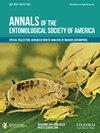Longitudinal Career Survey of Entomology Doctoral Graduates Suggests That Females Are Disadvantaged in Entomology Job Market
IF 1.8
3区 农林科学
Q1 ENTOMOLOGY
引用次数: 2
Abstract
Abstract Here, I provide data from a longitudinal survey that suggests that male entomology doctoral graduates are more successful at getting scientific positions than female graduates are. I digitally followed over 800 male and female doctorates graduating between 2001 and 2018 over several years to determine occupational outcomes. Males significantly outnumber females in industry positions, and occupy more academic positions and government jobs than females. Males may get a head start in employment by publishing significantly more scientific papers during their graduate programs than do females, setting them up to be more competitive. Once hired into academia, males appear to continue this publication pattern, obtaining significantly higher H-indices than female academic colleagues later in their careers, which may play a role in being promoted more quickly than females. Males are also favored by institutions at which they previously interned: Males working as postdoctoral scientists in USDA labs end up being hired into significantly more permanent jobs at USDA than females who also were postdocs at USDA. Another important result of the research is the finding that the majority of both genders undergo postdoctoral training, but fewer than 25% of entomology postdocs get academic positions, demonstrating the bleak outlook of the academic job market.对昆虫学博士毕业生的纵向职业调查表明,女性在昆虫学就业市场中处于劣势
在这里,我提供了一项纵向调查的数据,该数据表明昆虫学的男性博士毕业生比女性毕业生更能成功地获得科学职位。几年来,我以数字方式跟踪了2001年至2018年期间毕业的800多名男女博士,以确定职业结果。男性在行业职位上的数量明显超过女性,在学术职位和政府职位上的比例也高于女性。男性在研究生期间发表的科学论文要比女性多得多,这可能会让他们在就业方面占据先机,从而使他们更具竞争力。一旦进入学术界,男性似乎会继续这种发表模式,在职业生涯后期获得明显高于女性学术同事的h指数,这可能在比女性更快晋升方面发挥作用。男性也受到他们之前实习过的机构的青睐:在美国农业部实验室担任博士后科学家的男性最终在美国农业部获得的长期职位要比同样在美国农业部担任博士后的女性多得多。该研究的另一个重要结果是,大多数男女都接受了博士后培训,但只有不到25%的昆虫学博士后获得了学术职位,这表明学术就业市场的前景黯淡。
本文章由计算机程序翻译,如有差异,请以英文原文为准。
求助全文
约1分钟内获得全文
求助全文
来源期刊
CiteScore
4.90
自引率
0.00%
发文量
25
审稿时长
6-12 weeks
期刊介绍:
The Annals of the Entomological Society of America exists to stimulate interdisciplinary dialogue across the entomological disciplines and to advance cooperative interaction among diverse groups of entomologists. It seeks to attract and publish cutting-edge research, reviews, collections of articles on a common topic of broad interest, and discussion of topics with national or international importance. We especially welcome articles covering developing areas of research, controversial issues or debate, and topics of importance to society. Manuscripts that are primarily reports of new species, methodology, pest management, or the biology of single species generally will be referred to other journals of the ESA. The most important criteria for acceptance are quality of work and breadth of interest to the readership.

 求助内容:
求助内容: 应助结果提醒方式:
应助结果提醒方式:


